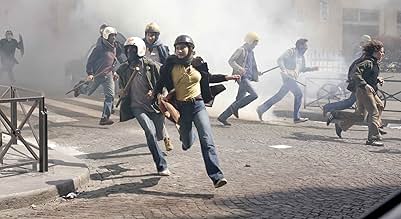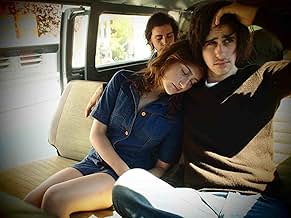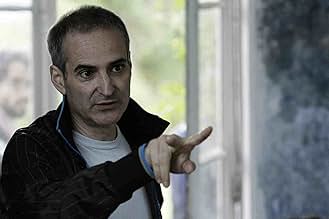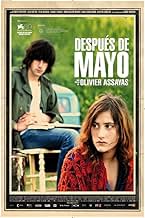Après mai
- 2012
- Tous publics
- 2h 2m
IMDb RATING
6.4/10
4.8K
YOUR RATING
In the months after the heady weeks of May '68, a group of young Europeans search for a way to continue the revolution believed to be just beginning.In the months after the heady weeks of May '68, a group of young Europeans search for a way to continue the revolution believed to be just beginning.In the months after the heady weeks of May '68, a group of young Europeans search for a way to continue the revolution believed to be just beginning.
- Awards
- 5 wins & 4 nominations total
Felix Armand
- Alain
- (as Félix Armand)
Bobbi Salvör Menuez
- Leslie
- (as India Salvor Menuez)
- Director
- Writer
- All cast & crew
- Production, box office & more at IMDbPro
Featured reviews
Olivier Assayas's film 'Something in the Air' is an affectionate, although not uncritical, look at the lives of young French radicals after 1968. Watching it, you get an interesting sense of an era when students were interested in something other than building their careers (although the protagonists don't all completely abandon their bourgeois dreams); there's also the contrast between their profound political beliefs, and the feeling that their beloved freedom is basically the freedom of being young and moneyed - the revolution as a gap year, so to speak. The way that a life spent chasing experience ultimately does not build the foundation of lasting relationships is also well-conveyed. Overall, the cast are a little too beautiful - who wouldn't be a revolutionary when the benefits were so obvious? - and if the film has a serious weak-point, it's in not fully explaining quite why youth was drawn to the counter-culture except in a vague, spirit-of-the-age type way. A final quibble - the English translation of the French title (Apres Mai) is an awful one, better befitting a light romantic comedy.
An experimental coming of age drama that has a good story to tell, but lacks a narrative. Director Olivier Assayas undoubtedly has talent (Carlos), but this film is definitely a misstep in his career.
"Apres Mai", french for after may. Set after the May 68 riots and their immediate aftermath. Students keep protesting and then partying, sometimes they're complaining about how unjust everything is for them and other times they're in Italy getting high.
It starts out good with fast paced editing, a moving soundtrack, great cinematography and a couple of rebel students that made me feel like it was going to be something similar to "Carlos". The movie lost its direction after the first 30 minutes or so and wandered onto other less interesting themes like the hippie culture.
I'd recommend it to people who liked movies similar to "Not Fade Away", "The Dreamers", or "Summer Hours".
"Apres Mai", french for after may. Set after the May 68 riots and their immediate aftermath. Students keep protesting and then partying, sometimes they're complaining about how unjust everything is for them and other times they're in Italy getting high.
It starts out good with fast paced editing, a moving soundtrack, great cinematography and a couple of rebel students that made me feel like it was going to be something similar to "Carlos". The movie lost its direction after the first 30 minutes or so and wandered onto other less interesting themes like the hippie culture.
I'd recommend it to people who liked movies similar to "Not Fade Away", "The Dreamers", or "Summer Hours".
The problem with autobiographical cinema is that it can be very self-indulgent or just downright dull depending on the life being portrayed. Olivier Assayas made "Apres Mai" in 2012, looking back to his student days in the Paris of 1971. To give the film its English title it was a time when there was "Something in the Air", revolution mostly. It was a time when France, indeed the world, was changing. Assayas himself went on to have a very successful and productive career in cinema but you would never guess it from this film in which he is a callow youth , (played by newcomer Clement Metayer), going through the motions most of us went through at the time without realising we only made a difference if we were part of a much larger picture. Autobiographical cinema is better when it makes that larger picture the centre of attention. Of course, maybe I'm just an old cynic who now finds that period of student revolution not so much 'something in the air' as something in the past. Fundamentally this is a film for Assayas acolytes and old hippies who want to relive their youth, very well done for what it is, but ultimately adding little to the Assayas canon.
In 1968 in Paris, France, the something in the air was revolution. In March of that year, a single spark began a revolt when a small group of students at Nanterre University took to the streets to protest conditions at the University. By July, workers had shut down Paris with a general strike in which ten million workers took part, occupying factories and marching in solidarity with students, who occupied the Sorbonne. The objectives were self-management by workers, a decentralization of economic and political power and participatory democracy in the factories and universities. By the end of July, the government of the autocratic Charles de Gaulle was teetering on the brink of collapse.
The impact of the 1968 near revolution is still being felt three years later in February, 1971 when Olivier Assayas' semi-autobiographical Something in the Air opens. A demonstration is held at the Place de Clichy in Paris as a teacher in a high school class reads a passage from Pascal, "Between us and Heaven or Hell there is only life, which is the frailest thing in the world." At the same time, the brutal police repression of a young protester, Richard Deshayes, takes place in nearby streets demonstrating the immediacy of Pascal's words. Deshaves loses an eye after being hit in the face by a smoke grenade, and the poster of his bloody head is shown as a symbol of resistance throughout the film.
Something in the Air is about coming-of-age and the awakening of conscience, and Assayas has the courage to remind us of the need to align our actions in life with our beliefs and conscience. Events are shown from the perspective of Gilles (Clément Métayer), a 17-year-old high school student who is a prospective filmmaker, painter of considerable talent as well as a political activist. Gilles and his friends Alain (Felix Armand) and Jean-Pierre (Hugo Conzelmann) are activists in the political arena, working to create a better society. They distribute leaflets, contribute articles to left-wing magazines, and spray paint graffiti slogans on the walls. After a security guard is seriously injured by a Molotov cocktail thrown by one of the protesters, however, Gilles and his new girlfriend Christine (Lola Creton) leave the country for Italy.
On the trip with a group of activist filmmakers, Gilles is told that he can only borrow a camera only if he does agitprop because "we don't do fiction." At a showing of a revolutionary film, a discussion follows about whether to use conventional style or "revolutionary syntax" to get their message across. Although the film is about ideas, we never know exactly which of the student activists are Anarchists, Trotskyites, Maoists, Marxists, Stalinists, or democratic Socialists, but it hardly seems to matter. What makes the film so unique is not only a script that is highly literate but its portrayal of young people with respect for their minds and an appreciation of their dignity and commitment, attributes normally not seen in films about the counterculture. Author Anne Morris said, "The irony of commitment is that it's deeply liberating – in work, in play, in love."
Assayas correctly notes that, in addition to advocating political and economic change, the protesters also want to change outmoded social conventions, particularly the stranglehold of the scientific/materialist paradigm and the puritan sexual mores that place barriers on spiritual growth and full self-expression. What comes across as special, even more than ideas about filmmaking or political theory, are the relationships they have with each other that express their openness and love. The film also blends idealism with music in a way that the songs of Syd Barrett-era, Booker T & the MG's, Nick Drake, and an inspiring rendition of a Phil Ochs song by Johnny Flynn feel organic to the scenes in which they are used.
When the students ultimately gain a sense that life is governed by practicality as well as idealism, they gradually drift away to parents, jobs, school and the careers that will shape their lives, but they have already made a difference. Though their immediate objectives were only partially met, later in the year, uprisings began in Poland and Czechoslovakia that would have a profound effect on the Soviet system, protesters marched at the Democratic Convention in Chicago, rioted at Kent State, and the brutal war against a small, peasant country came to an end several years later.
Though the film is more about personal goals and ambitions than revolution and Assayas does not shed much light on the causes that the students fought for, no film in recent memory has presented such an authentic view of the immediacy of the period as Something in the Air. The feeling of change is electric and its mood is brilliantly reflected by the film's lack of cynicism and condescension. Assayas brings us back to a time when everything seemed possible and people were truly young because the world, maybe for the first time, began to dream of what it would be like to be young with them.
The impact of the 1968 near revolution is still being felt three years later in February, 1971 when Olivier Assayas' semi-autobiographical Something in the Air opens. A demonstration is held at the Place de Clichy in Paris as a teacher in a high school class reads a passage from Pascal, "Between us and Heaven or Hell there is only life, which is the frailest thing in the world." At the same time, the brutal police repression of a young protester, Richard Deshayes, takes place in nearby streets demonstrating the immediacy of Pascal's words. Deshaves loses an eye after being hit in the face by a smoke grenade, and the poster of his bloody head is shown as a symbol of resistance throughout the film.
Something in the Air is about coming-of-age and the awakening of conscience, and Assayas has the courage to remind us of the need to align our actions in life with our beliefs and conscience. Events are shown from the perspective of Gilles (Clément Métayer), a 17-year-old high school student who is a prospective filmmaker, painter of considerable talent as well as a political activist. Gilles and his friends Alain (Felix Armand) and Jean-Pierre (Hugo Conzelmann) are activists in the political arena, working to create a better society. They distribute leaflets, contribute articles to left-wing magazines, and spray paint graffiti slogans on the walls. After a security guard is seriously injured by a Molotov cocktail thrown by one of the protesters, however, Gilles and his new girlfriend Christine (Lola Creton) leave the country for Italy.
On the trip with a group of activist filmmakers, Gilles is told that he can only borrow a camera only if he does agitprop because "we don't do fiction." At a showing of a revolutionary film, a discussion follows about whether to use conventional style or "revolutionary syntax" to get their message across. Although the film is about ideas, we never know exactly which of the student activists are Anarchists, Trotskyites, Maoists, Marxists, Stalinists, or democratic Socialists, but it hardly seems to matter. What makes the film so unique is not only a script that is highly literate but its portrayal of young people with respect for their minds and an appreciation of their dignity and commitment, attributes normally not seen in films about the counterculture. Author Anne Morris said, "The irony of commitment is that it's deeply liberating – in work, in play, in love."
Assayas correctly notes that, in addition to advocating political and economic change, the protesters also want to change outmoded social conventions, particularly the stranglehold of the scientific/materialist paradigm and the puritan sexual mores that place barriers on spiritual growth and full self-expression. What comes across as special, even more than ideas about filmmaking or political theory, are the relationships they have with each other that express their openness and love. The film also blends idealism with music in a way that the songs of Syd Barrett-era, Booker T & the MG's, Nick Drake, and an inspiring rendition of a Phil Ochs song by Johnny Flynn feel organic to the scenes in which they are used.
When the students ultimately gain a sense that life is governed by practicality as well as idealism, they gradually drift away to parents, jobs, school and the careers that will shape their lives, but they have already made a difference. Though their immediate objectives were only partially met, later in the year, uprisings began in Poland and Czechoslovakia that would have a profound effect on the Soviet system, protesters marched at the Democratic Convention in Chicago, rioted at Kent State, and the brutal war against a small, peasant country came to an end several years later.
Though the film is more about personal goals and ambitions than revolution and Assayas does not shed much light on the causes that the students fought for, no film in recent memory has presented such an authentic view of the immediacy of the period as Something in the Air. The feeling of change is electric and its mood is brilliantly reflected by the film's lack of cynicism and condescension. Assayas brings us back to a time when everything seemed possible and people were truly young because the world, maybe for the first time, began to dream of what it would be like to be young with them.
Just watched the movie yesterday, and for those who are interested in the high school movement of France in the early '70s and expect the movie to have a say about the topic, it would be a disappointment. Therefore, alter your expectations towards an autobiography of a young artist who is in pursuit of love, his ideals and independence.
The opening of the movie is promising with protests, group of students clashing ideas and then acting based on those ideas. You can actually sense that there is something in the air which is obviously the belief in the revolution. Yet later, it seems quite undecided whether to focus on the aspect of revolutionary ideas or on the personal lives and thoughts of the characters. Both topics can be processed in a movie, however in this one both aspects seems inconclusive.
Also what I see missing in the movie is that all young revolutionaries were not faced a tough life or living a life that is rather comfortable. They want to change things but it seems they are not sure what they want to change or how bad things are for the working class. I am not expecting a person of that age to be fully aware of the situation but I wondered how would they react in a desperate situation. They do not look unhappy with their life.
If I had watched the movie with different expectations, I would have enjoyed it more. It is still likable but not satisfying.
The opening of the movie is promising with protests, group of students clashing ideas and then acting based on those ideas. You can actually sense that there is something in the air which is obviously the belief in the revolution. Yet later, it seems quite undecided whether to focus on the aspect of revolutionary ideas or on the personal lives and thoughts of the characters. Both topics can be processed in a movie, however in this one both aspects seems inconclusive.
Also what I see missing in the movie is that all young revolutionaries were not faced a tough life or living a life that is rather comfortable. They want to change things but it seems they are not sure what they want to change or how bad things are for the working class. I am not expecting a person of that age to be fully aware of the situation but I wondered how would they react in a desperate situation. They do not look unhappy with their life.
If I had watched the movie with different expectations, I would have enjoyed it more. It is still likable but not satisfying.
Did you know
- TriviaWith the exception of Lola Créton, the actors portraying the youths were inexperienced, mostly first-time actors found through director Olivier Assayas and casting director Antoinette Boulat having flyers handed out in front of high schools and having set up a casting Facebook page. They did audition other experienced young actors, but only Créton was selected.
- ConnectionsFeatured in At the Movies: Venice Film Festival 2012 (2012)
- How long is Something in the Air?Powered by Alexa
Details
- Release date
- Country of origin
- Official sites
- Languages
- Also known as
- Something in the Air
- Filming locations
- Brunoy, Essonne, France(High School: Lycee Talma)
- Production companies
- See more company credits at IMDbPro
Box office
- Budget
- €5,400,000 (estimated)
- Gross US & Canada
- $85,154
- Opening weekend US & Canada
- $13,288
- May 5, 2013
- Gross worldwide
- $1,305,473
- Runtime
- 2h 2m(122 min)
- Color
- Sound mix
- Aspect ratio
- 1.85 : 1
Contribute to this page
Suggest an edit or add missing content


























